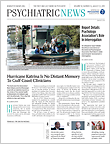What is the relationship between the codes in my DSM and ICD codes?
Since 1980, every code that has been listed in DSM has been an ICD-9 code. However, DSM-5, unlike previous versions of DSM, contains both ICD-9 and ICD-10 codes. For most behavioral health providers, if you have a DSM-5, you are ready for the transition to ICD-10 on October 1.
Where do I find the ICD-10 codes in DSM-5?
Figure 1 is an illustration taken from DSM-5. The code on the left is an ICD-9 code. The code on the right is an ICD-10 code. Beginning October 1, you will need to use the code on the right.
Since ICD-10 has more codes than ICD-9, how do I code disorders that now have multiple coding options?
Part of the reason the U.S. is upgrading to a newer version of ICD is because it allows providers to be more specific in their diagnoses. For example, there is only one ICD-9 code you can use to diagnose anorexia nervosa. The code is 307.1. ICD-10 provides a unique code for the two types of anorexia nervosa—the binge-eating/purging type and a separate code for the restricting type. With ICD-10, you can now be more specific by assigning a different code to each type.
Figure 2 is an excerpt from a page of DSM-5 to show what these more specific codes look like in the classification:
Figure 3 is an excerpt from the Feeding and Eating Disorders chapter of DSM-5 to show what these look like in the text:
If I have DSM-5, do I need to purchase an ICD-10 to identify correct billing codes?
No. If you are a behavioral health provider, DSM-5 should remain your primary resource. It is a tool that provides you with diagnostic criteria and corresponding ICD-10 codes.
Do I need DSM-5 to practice, or can I just use the ICD-10 book?
Providers should continue to use DSM-5 to determine the correct diagnosis of a mental disorder. ICD-10 does not contain information to help guide diagnosis; it is simply a listing of disease names and their corresponding codes. There is a diagnostic book, The ICD-10 Classification of Mental and Behavioural Disorders (referred to as the “Blue Book”), which contains diagnostic criteria and non-U.S. ICD-10 codes. However, this book was last updated in 1992 and is not in line with contemporary thinking about mental illness in the same way as DSM-5.
Does the U.S. officially recognize DSM-5 for use in identifying ICD-10 codes?
Yes. The National Center for Health Statistics and the Centers for Medicare and Medicaid Services (CMS) oversee the official implementation of ICD-10 in the U.S. CMS has posted the following on its website:
“
DSM-5 contains the standard criteria and definitions of mental disorders now approved by the American Psychiatric Association (APA), and it also contains both ICD-9-CM and ICD-10-CM codes (in parentheses) selected by APA. Since
DSM-IV only contains ICD-9-CM codes, it will cease to be recognized for criteria or coding for services with dates of service of October 1, 2015 or later. Updates for
DSM-5 criteria and their associated ICD-10-CM codes (identified by APA) will be found on the
DSM-5 website. ■
For additional help on using DSM-5 to transition to ICD-10, view APA’s
free webinar tutorial. If you do not yet have
DSM-5, you can
order it at a discount. You can also download the Brief Guide to Using
DSM-5 in the Transition to ICD-10
here.



